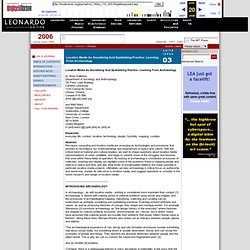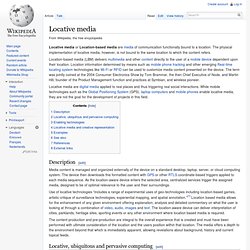

Participatory GIS, Volunteered Geographic Information and Citizen S...
Geospatial Revolution Project. MAS_Context_Issue07_INFORMATION.pdf (application/pdf-Objekt) Participatory Learning and Action. Announcement on the future of the PLA series The Participatory Learning and Action (PLA) series is 25 years old this year. At this important milestone, IIED is taking stock of PLA to look at its legacy and its future direction. The series will be put on hold, pending this review, after issue no. 66.
For more information read the future of the series. Independent review of Participatory Learning and Action In the summer of 2013, we contracted independent consultants Mary Myers and Mary Hobley to evaluate PLA and outline possible options for its future. Latest issues PLA 66: Tools for supporting sustainable natural resource management and livelihoods Edited by Holly Ashley, Nicole Kenton & Angela Milligan We are pleased to announce the publication of PLA 66, which includes general articles submitted by readers on participatory approaches to sustainable natural resource management and livelihoods. PLA 65: Biodiversity and culture: exploring community protocols, rights and consent Recent issues.
Locative Media As Socialising And Spatializing Practice: Learning From Archaeology - Leonardo Electronic Almanac. Locative Media As Socialising And Spatializing Practice: Learning From Archaeology by Anne Galloway Department of Sociology and Anthropology 7th Floor, Loeb Building Carleton University 1125 Colonel By Drive Ottawa, Ontario Canada K1S 5B6 anne [@] plsj [dot] org and Matt Ward Design Department Goldsmiths College University of London New Cross, London SE14 6NW United Kingdom m [dot] ward [@] gold [dot] ac [dot] uk Keywords everyday life, context, locative, technology, design, hybridity, mapping, curation Abstract Pervasive computing and locative media are emerging as technologies and processes that promise to reconfigure our understandings and experiences of space and culture.

With the critical hand of material and cultural studies, we start to shape questions about locative media representations of urban mobilities, and begin to unearth some of the struggles and tensions that exist within these fields of operation. And as Hodder [4] explains, back to top REFERENCES 1. 2. 3. 4. 5. 6. 7. Locative media. Locative media or Location-based media are media of communication functionally bound to a location.

The physical implementation of locative media, however, is not bound to the same location to which the content refers. Location-based media (LBM) delivers multimedia and other content directly to the user of a mobile device dependent upon their location. Location information determined by means such as mobile phone tracking and other emerging Real-time locating system technologies like Wi-Fi or RFID can be used to customize media content presented on the device.
The term was jointly coined at the 2004 Consumer Electronics Show by Tom Brammar, the then Chief Executive of Node, and Martin Hill, founder of the Product Management function and practices at Symbian, and wireless pioneer. Locative media are digital media applied to real places and thus triggering real social interactions. Description[edit] Locative, ubiquitous and pervasive computing[edit] Enabling technologies[edit]